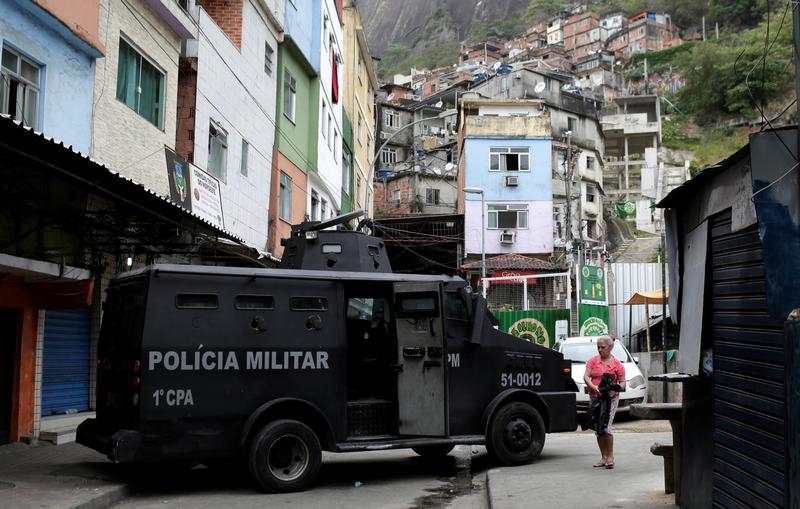Judicial Action Against Police Abuse in Brazil
Police abuse is a chronic human rights problem that Human Rights Watch has worked on for decades in Brazil.In the last five years, Brazilian police killed 22,000 people, most of them Black.

. We have documented extrajudicial executions and other killings by police that are the result of the use of excessive force. We have also shown the failure of authorities to properly investigate those deaths and hold abusive officers accountable. President Jair Bolsonaro, a former army captain, has encouraged police violence and proposed legal changes that would make it harder to hold abusive officers accountable. Human Rights Watch has been at the forefront of the fight against those damaging legislative proposals. Recent impact of work by us and our partners in Rio de Janeiro, one of the states with the highest rates of police killings, shows progress is possible even under a reckless federal government. In April, families of victims, community associations, the Rio de Janeiro Public Defender’s Office, Human Rights Watch, and other organizations testified at a Brazil Supreme Court hearing about strategies to reduce police killings in Rio de Janeiro. Upon request of Justice Edson Fachin, Human Rights Watch submitted recommendations for improving forensic analysis and investigations into police abuses. In May, Justice Fachin issued an opinion that cites much of this testimony and devotes three of its 71 pages to quoting Human Rights Watch’s presentation at the hearing. Justice Fachin endorsed some of our recommendations, such as the need for a plan with concrete measures, to curb police killings. One of the other justices asked for more time to support or dissent, which has put the full ruling on hold. Human Rights Watch has also been pressing prosecutors to ensure adequate investigations into police killings. In April, we sent a letter to Rio de Janeiro Attorney General Luciano Mattos, criticizing his decision to dissolve a unit of prosecutors specialized in police abuse. Three weeks later, a police raid in the low-income neighborhood Jacarezinho left 28 people dead. Human Rights Watch immediately called for Mattos to launch an independent investigation into the killings without relying on the police to investigate its own members. Mattos did open an investigation a few days later, and, per Human Rights Watch recommendations, confirmed that prosecutors would gather their own evidence rather than using the evidence the police had collected. Strong evidence of police abuse in Jacarezinho only accentuates the need for a permanent specialized unit of prosecutors. In his May opinion, Justice Fachin ordered that the National Council of Prosecutor’s Offices (CNMP, in Portuguese), a national body that oversees the country’s prosecutors, review Mattos’ decision to dissolve the specialized unit, citing Human Rights Watch’s findings. Fachin’s order will enter into force if his opinion is supported by the full Supreme Court. On May 31, we released unique research on the Jacarezinho raid that included evidence of extrajudicial killings, destruction of crime scene evidence, and serious failures in the police investigation. Human Rights Watch called on Mattos and federal prosecutors to investigate the police commanders who planned and executed the raid, in addition to the officers who pulled the trigger. In June, a working group led by Rio de Janeiro federal prosecutors that includes the Public Defender’s Office, local non-governmental organizations, and other groups asked CNMP to call on State Prosecutor’s Offices around the country to investigate all police killings, and not leave investigations in the hands of police, a call that Human Rights Watch supports. In an August 15 New York Times op-ed, Human Rights Watch senior researcher César Muñoz laid out the horrendous human toll of police abuse, particularly on Black Brazilians living in low-income neighborhoods, and its harmful effects on public security.
The suffering will not abate as long as there is no accountability. Human Rights Watch will continue to seek comprehensive reform so that instead of terrorizing communities, police become effective, professional forces that serve them.
Read the full article at the original website
References:
- https://www.hrw.org/americas/brazil
- https://www.youtube.com/watch?v=uI9AiscRDvU
- https://www.hrw.org/news/2020/02/03/brazil-possible-evidence-tampering-police-killings
- https://www.cnnbrasil.com.br/politica/com-novo-comando-do-congresso-bolsonaro-quer-aprovar-excludente-de-ilicitude/
- https://www.hrw.org/news/2019/02/06/brazil-bill-could-shield-abusive-police
- https://www.hrw.org/pt/news/2021/04/19/378563
- https://www.hrw.org/news/2021/05/20/recommendations-improving-forensic-analysis-and-investigations-police-killings-rio
- https://www.migalhas.com.br/arquivos/2021/5/59CED8B1151D6B_fachin.pdf
- https://www.hrw.org/news/2021/04/16/letter-rio-de-janeiros-attorney-general-luciano-mattos
- http://www.mprj.mp.br/home/-/detalhe-noticia/visualizar/104803
- http://www.mpf.mp.br/regiao2/sala-de-imprensa/noticias-r2/mortes-apos-acao-policial-mpf-articula-pedido-para-mps-assumirem-investigacao-dos-casos/view
- https://www.hrw.org/news/2021/08/15/rio-cautionary-tale-police-violence
